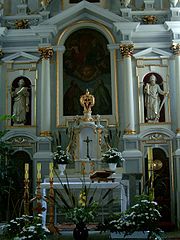
A History Of The Mass And Its Ceremonies In The Eastern And Western Church -Rev John O'Brien A.M.
CHAPTER I
THE MASS—ORIGIN OF THE WORD, ETC.
AS to the origin of the word Mass liturgical writers are not entirely agreed. According to some, it comes from the Hebrew “משאה,” Massah, a debt or obligation; others derive its name from the Greek “μύησις,” Myesis, initiation; whilst a third class maintain that it is nothing else but an improved form of the old obsolete Mes or Messe, which, with the people of Northern Europe, meant a banquet or convivial gathering, and not unfrequently also a sacrifice.
The great body, however, of liturgical writers are in favor of deriving it from the Latin “Missa” or “Missio,” a dismissal, referring to the custom in vogue during the first five or six centuries of the Christian Church—when the Disciplina Arcani, or Discipline of the Secret, prevailed—of dismissing the Catechumens and Public Penitents from the house of God before the more solemn part of divine service began.
From the twofold dismissal—viz., that of the Catechumens at the beginning of Mass, and the other, of the faithful, at the end—the entire service used to be known by the plural appellations of Missæ or Missiones (that is, the dismissals); and hence the import of such phrases so often to be met with in the writings of the early Fathers, as “inter Missarum solemnia,” “Missas facere,” and “Missas tenere.” Hence, also, the twofold division known as the “Mass of the Catechumens” and the “Mass of the Faithful,” the former extending from the beginning to the Offertory, the latter from the Offertory to the end.
Copyright ©1999-2023 Wildfire Fellowship, Inc all rights reserved

 Keep Site Running
Keep Site Running